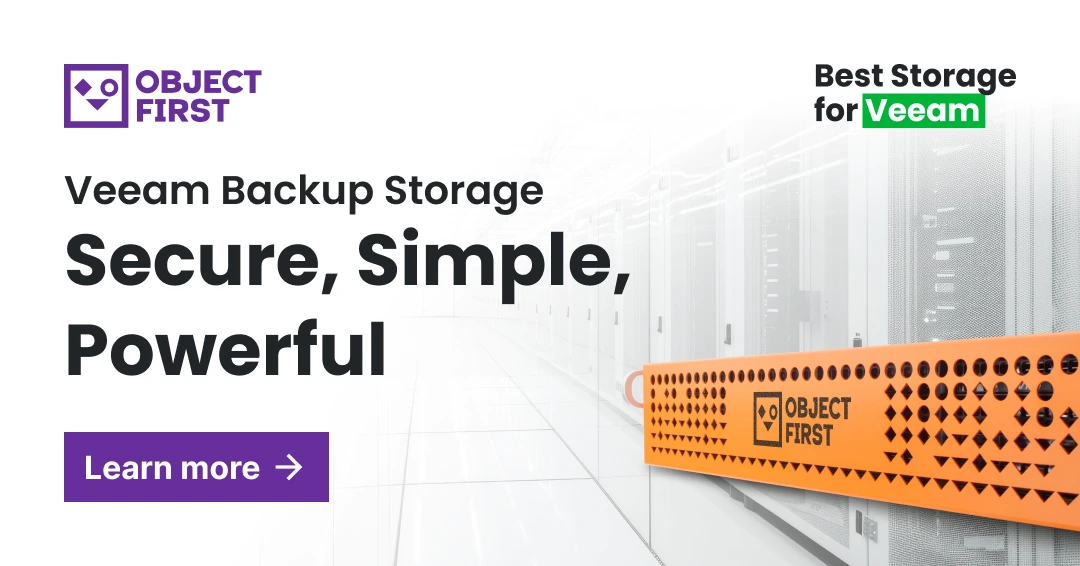Cloud vs. On-Premise vs. Hybrid Backup: Which is Better?
Data backup and recovery is one of the most vital elements to ensure business continuity in the case of any ransomware, disaster, or cyber-attack. Admins often choose between two different backup solutions: cloud and on-premises. IT leaders must quickly evaluate and purchase these backup solutions to outpace the threat of attack, disaster, and data corruption. We can help make this choice simple.
On-premises and cloud backup solutions have numerous pros and cons to evaluate. For many stuck in the research phase, the interest always hovers around cost efficiency, scalability, ease of use, reliability, and data security. Of course, the best choice always depends on your organization’s specific needs and circumstances.
What is On-Premise Backup?
On-premises backup software stores copies of business data and files on local storage devices, including physical disk and tape. This type of backup is an effective solution for businesses with managed IT teams, especially the mid-enterprise, that want to store, secure, and protect critical data as part of their local retention and data management policies.
Pros and cons of on-premise backup
| Pros | Cons |
|---|---|
|
Offline access.
The ability to access data without an internet connection. This is particularly useful in case of network or widespread internet failure, meaning connectivity issues do not hamper you from being able to access your critical data. |
Offline access.
The ability to access data without an internet connection. This is particularly useful in case of network or widespread internet failure, meaning connectivity issues do not hamper you from being able to access your critical data. |
|
Security.
Local storage devices are stored within an organization’s physical location and secured as part of the local policies. While not impervious to intrusion, this puts control back into the admins and ensures data does not leave its origin location. |
Maintenance.
Businesses are responsible for maintaining their hardware: regular updates, troubleshooting, and repairs as needed. |
|
Low monthly cost.
More cost-effective in the long run, as organizations don’t have to pay monthly fees to a third-party provider. |
Disaster.
Local storages are vulnerable to fires, floods, or other events that can damage the physical infrastructure. |
|
Complete control.
Organizations can manage backups according to their policies and procedures and access backups anytime. |
|
|
Quick data recovery.
On-premises backup provides faster access and recovery after a ransomware attack or disaster. It means businesses can resume operations quickly and prevent significant downtime, which translates to better productivity and revenue. |
What is Cloud Backup?
Cloud backup solutions store your data on a cloud service provider’s infrastructure accessed via the Internet. It is a reliable way of protecting your local and cloud-based critical data from loss due to unforeseen emergencies such as hardware failure or natural disasters.
Pros and cons of cloud backup
| Pros | Cons |
|---|---|
|
High Availability.
With the data stored in the cloud, you can access it from anywhere with an internet connection. You won’t lose any critical information if your physical storage device fails. |
Internet Connectivity.
Since cloud backup requires a stable and robust internet connection, poor connectivity can lead to data backup delays or even data loss during the backup process. |
|
Scalability.
As your organization’s digital assets increase, you can adjust your storage capacity accordingly. The system can quickly adapt and expand as your business grows without requiring significant hardware or software updates. |
High monthly cost.
Cloud storage providers often charge monthly or yearly subscription fees, which can add up over time, especially for companies that need to store a large amount of data. There may also be additional charges for data retrieval or extra features. |
|
No Maintenance.
Cloud backup system updates itself automatically and ensures that the data is safely stored in remote servers. This benefit eliminates additional hardware or software installation, reducing the overall cost and effort required to operate a backup system. |
Data privacy.
In some cases, you may have limited control over where your data is stored or who can access it, which can raise privacy concerns, mainly if you handle sensitive data. |
|
Security concerns.
Storing data in the cloud raises security concerns, as the data is stored on servers controlled by third-party providers. This can leave your data vulnerable to cyber threats or hacking. |
Cloud backup use cases
In addition to Cloud backup pros, it is also ideal for some of the use cases, such as:
- Disaster Recovery. It is when a business needs to recover a server, part, or the whole data center without the cost and hassle of maintaining a spare server or the whole disaster recovery site or secondary data center
- Backup and recovery of edge computing resources such as remote or branch offices (ROBO), laptops, etc.
- Backup and recovery of the cloud and SaaS applications and data for businesses that don’t require an on-premise copy of their cloud and SaaS data.
- Long-term archival and data retention. Public cloud cold storage services such as AWS Glacier and Glacier Deep Archive, and Azure Blob Cold and Archive tiers are good alternatives to tape for long-term data archival and retention.
Cloud Backup Options
There are several cloud backup options available that provide different features and levels of protection:
- Cloud Backup Services – online backup services allowing you to upload your data to their servers, securely stored and easily accessed and restored. The services are offered by backup-as-a-service (BaaS), disaster recovery-as-a-service (DRaasS), and data protection-as-a-service (DPaaS) vendors and service providers..
- Cloud Backup Appliances – physical devices installed on your network to automatically back up your data to a cloud storage provider.
- Hybrid Backup Solutions – combine local and cloud backup options to provide an extra layer of protection. Typically includes a physical backup device on-premises that backs up data to the cloud. An example of a hybrid backup solution is Veeam.
- Public Cloud Providers – such as Amazon Web Services (AWS) and Microsoft Azure, offer cloud backup services as part of their platform. These services allow storing and protecting data in the cloud with built-in backup and recovery options.
How to choose, or who uses what?
| The best solution | Why? | |
|---|---|---|
| Laptop or Workstation | Cloud backup is only | Hybrid Backup |
|
Small and medium business (SMB)
|
Cloud backup is often preferred, whereas hybrid – is less used. |
|
| Mid-enterprise | Hybrid Backup |
|
| Large enterprises | On-premise or Hybrid Backup |
|
Note: Mid-size and large enterprises have data and applications in Public Cloud, such as AWS and Microsoft Azure, and their data centers.
Conclusion
Choosing between cloud, on-premises, or a hybrid for backup depends on your size, needs, budget, security preferences, and resources. Cloud backup solutions can offer some serious advantages to SMBs who may be able to utilize them more effectively due to staff or expertise shortages. But due to their numerous benefits, on-premises backup solutions remain popular and more effective among mid to large enterprises.
On-premises backup (and hybrid) solutions provide significant control to businesses that prefer to own, maintain, and manage their data backup and storage systems. The storage systems can be tailored to fit the organization’s specific needs, workflow integrations, and protocols unavailable in cloud solutions. Owning an on-premises backup solution reduces ongoing expenses, allowing companies to realize cost savings in the long run.
With the right hybrid backup model and infrastructure, businesses can become disaster and ransomware resilient, take advantage of a tiered-out backup strategy, and easily manage local and remote data. Ootbi by Object First is perfectly built to maximize the hybrid landscape. We recommend that all businesses operate in the hybrid model to take advantage of the inherent features of both on-premises and cloud while achieving the perfect mixture of mobility, performance, and security.

